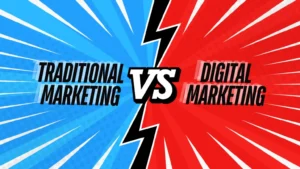Determining the Most Valuable Marketing Strategy
As a business owner, selecting the most effective marketing strategy is pivotal to optimizing your marketing budget. The truth is, both digital and traditional marketing can play integral roles in your marketing strategy.
Traditional marketing still offers numerous advantages, especially for businesses catering to older or less tech-savvy customers. Individuals who don’t respond well to digital marketing might favour direct mail advertising or television commercials, and some may solely engage with radio advertisements. Your choice of marketing strategy greatly depends on the audience you intend to reach.
Additionally, it’s vital to consider your team’s proficiency in managing a particular marketing strategy. Transitioning from print and TV advertising to YouTube and social media ads may necessitate digital marketing training. Combining both digital and traditional marketing to work harmoniously toward your objectives is referred to as integrated marketing. You can achieve this by maintaining a consistent call to action across all your marketing materials, thereby making your brand more distinctive and recognizable.
Harnessing the Power of Diverse Marketing Avenues
To optimize your marketing budget, a balanced combination of traditional and digital marketing is likely your best approach. By diversifying your marketing endeavors, you can reach a wider audience and effectively evaluate the performance of different marketing tactics against each other.
Need assistance with your marketing strategy? Mailchimp makes email marketing easier than ever. It offers email automation and marketing tools that facilitate connecting with your audience and building your brand. Furthermore, you’ll find time-saving templates to assist in crafting compelling emails. Give Mailchimp a try today and elevate your next marketing campaign.
Below are a comparison of advantages and disadvantages of both traditional and digital marketing.
Advantages of Traditional Marketing
Traditional marketing, despite its centuries-old history, still holds certain advantages. One of the most significant benefits is its ubiquitous presence. Traditional marketing channels reach potential customers whether they are at home, commuting, walking, or driving, significantly expanding your outreach. This multifaceted advertising approach maximizes your chances of converting leads into sales and bolstering profits.
For businesses with less familiarity with digital marketing, traditional marketing presents a simpler alternative. The learning curve for digital marketing can be steep, even with a dedicated team. Thus, focusing predominantly on traditional marketing might be a more financially prudent choice for some.
The type of audience you aim to reach is another crucial factor. While digital marketing is effective for younger, tech-savvy demographics, it may alienate older or less digitally connected individuals. Traditional marketing is often better suited for these groups.
Disadvantages of Traditional Marketing
Traditional marketing has certain limitations:
- Limited Real-Time Interaction: Businesses have limited real-time interaction with consumers. You can’t directly interact with a print ad, unlike responding to a social media post or email.
- Immutability: Once you launch a print ad or broadcast a radio ad, you can’t make immediate changes. This immutability can be problematic if you need to correct errors or update information.
- Costly: Traditional marketing, such as print ads, can be expensive. Additionally, the return on investment can be challenging to measure, making it less cost-effective compared to digital alternatives.
Advantages of Digital Marketing
Digital marketing offers various advantages:
- Brand Development: Digital marketing helps convey your brand’s unique message and value proposition to your target market effectively.
- Personalization: Digital marketing enables personalized campaigns, allowing you to connect with your audience based on their specific needs.
- Wider Reach: You can expand your reach globally through your website and social media profiles, leveling the playing field with larger competitors.
- Accessibility: Digital marketing enhances accessibility for customers, allowing them to easily connect with your business online.
- Greater Engagement: It offers enhanced engagement opportunities, which can build brand loyalty and a strong reputation through interactive content and promotions.
- Lower Costs: Digital marketing is generally more cost-efficient than traditional marketing, making it accessible to small businesses.
- Measurable Results: Digital marketing strategies are highly measurable, providing real-time data to gauge the effectiveness of your campaigns.
Disadvantages of Digital Marketing
However, digital marketing comes with its own set of challenges:
- High Competition: The online landscape is highly competitive, making it essential to create standout campaigns and content.
- Dependence on Technology: Digital marketing relies on technology, which can fail or require regular updates.
- Time-Consuming: Managing digital marketing campaigns can be time-consuming, requiring careful planning and content curation.
- Security and Privacy Concerns: Privacy and security issues are critical, especially with the handling of customer data.
- Constant Learning: Digital marketing evolves rapidly, necessitating continuous learning and adaptation.
| Traditional | Digital |
| Advantages of Traditional Marketing Ubiquitous presence: Traditional marketing, despite its centuries-old history, still holds certain advantages. One of the most significant benefits is its ubiquitous presence. Traditional marketing channels reach potential customers whether they are at home, commuting, walking, or driving, significantly expanding your outreach. This multifaceted advertising approach maximizes your chances of converting leads into sales and bolstering profits.Simple marketing application: For businesses with less familiarity with digital marketing, traditional marketing presents a simpler alternative. The learning curve for digital marketing can be steep, even with a dedicated team. Thus, focusing predominantly on traditional marketing might be a more financially prudent choice for some.Focus on specific group: The type of audience you aim to reach is another crucial factor. While digital marketing is effective for younger, tech-savvy demographics, it may alienate older or less digitally connected individuals. Traditional marketing is often better suited for these groups. Disadvantages of Traditional Marketing Traditional marketing has certain limitations: Limited Real-Time Interaction: Businesses have limited real-time interaction with consumers. You can’t directly interact with a print ad, unlike responding to a social media post or email. Immutability: Once you launch a print ad or broadcast a radio ad, you can’t make immediate changes. This immutability can be problematic if you need to correct errors or update information. Costly: Traditional marketing, such as print ads, can be expensive. Additionally, the return on investment can be challenging to measure, making it less cost-effective compared to digital alternatives. | Advantages of Digital Marketing Digital marketing offers various advantages: Brand Development: Digital marketing helps convey your brand’s unique message and value proposition to your target market effectively. Personalization: Digital marketing enables personalized campaigns, allowing you to connect with your audience based on their specific needs. Wider Reach: You can expand your reach globally through your website and social media profiles, leveling the playing field with larger competitors. Accessibility: Digital marketing enhances accessibility for customers, allowing them to easily connect with your business online. Greater Engagement: It offers enhanced engagement opportunities, which can build brand loyalty and a strong reputation through interactive content and promotions. Lower Costs: Digital marketing is generally more cost-efficient than traditional marketing, making it accessible to small businesses. Measurable Results: Digital marketing strategies are highly measurable, providing real-time data to gauge the effectiveness of your campaigns. Disadvantages of Digital Marketing However, digital marketing comes with its own set of challenges: High Competition: The online landscape is highly competitive, making it essential to create standout campaigns and content. Dependence on Technology: Digital marketing relies on technology, which can fail or require regular updates. Time-Consuming: Managing digital marketing campaigns can be time-consuming, requiring careful planning and content curation. Security and Privacy Concerns: Privacy and security issues are critical, especially with the handling of customer data. Constant Learning: Digital marketing evolves rapidly, necessitating continuous learning and adaptation. |
Table: comparison of Traditional and digital marketing
source: Chaffey and Ellis -Chadwick, (2019); Williams, K. (n.d); Mailchimp, 2023
In conclusion, the choice between digital and traditional marketing depends on your target audience, your team’s capabilities, and your marketing objectives. A balanced approach often yields the best results, combining the strengths of both strategies to maximize your marketing budget’s efficiency.





